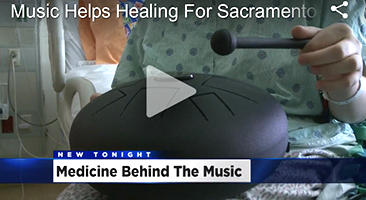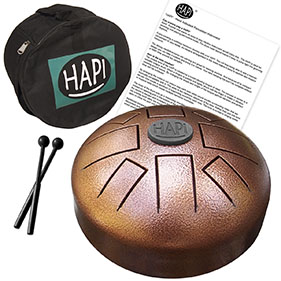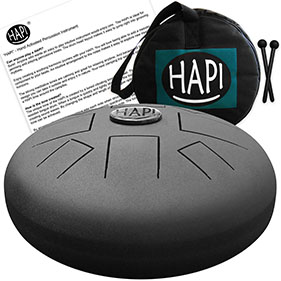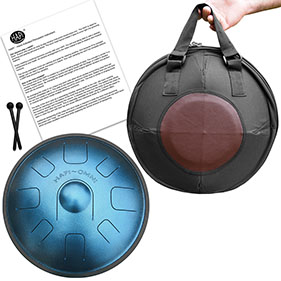HAPI Drums and Music Therapy

The HAPI Drum has been used with much success by licensed music therapists and their patients in many different ways. Some autistic children have had a very positive response to the drum. With no wrong notes to play and a soothing vibrational tone it is easy to interact with and enjoy. Smooth sides and a compact size make it easy to transport. Using mallets or hands one can work on motor skills, memory, communication, and mood alteration.
What is Music Therapy?
Music Therapy is the clinical and evidence-based use of music interventions to accomplish individualized goals within a therapeutic relationship by a credentialed professional who has completed an approved music therapy program.
Music therapy interventions have been designed to:
- Promote Wellness
- Manage Stress
- Alleviate Pain
- Express Feelings
- Enhance Memory
- Improve Communication
- Promote Physical Rehabilitation
Research in music therapy supports its effectiveness in a wide variety of healthcare and educational settings. Visit www.musictherapy.org for more information. Trained music therapists use music and all of its facets—physical, emotional, mental, social, aesthetic, and spiritual—to help clients to improve or maintain their health. Music therapists primarily help clients improve their health across various domains (e.g., cognitive functioning, motor skills, emotional and affective development, behavior and social skills, and quality of life) by using music experiences (e.g., free improvisation, singing, songwriting, listening to and discussing music, moving to music) to achieve treatment goals and objectives. It is considered both an art and a science. Music has been used as a healing force for centuries. Music therapy as we know it began in the aftermath of World Wars I and II. Musicians would travel to hospitals, particularly in the United Kingdom, and play music for soldiers suffering from war-related emotional and physical trauma. Music therapy can help children with communication, attention, motivation, and behavioral problems. Music can improve one's mood by reducing stress and lowering anxiety levels, which can help counteract or prevent depression. Music has been shown to affect portions of the brain. Part of this therapy is the ability of music to affect emotions and social interactions. Research shows that music therapy is associated with a decrease in depression, improved mood, and a reduction in state anxiety. Both descriptive and experimental studies have documented effects of music on quality of life, involvement with the environment, expression of feelings, awareness and responsiveness, positive associations, and socialization. The HAPI Drum works well as a tool for Music Therapists and their patients. It also has many benefits for those just looking for enjoyment from an easy to use instrument outside of a therapeutic environment. Its time to get HAPI!
Our most popular models for Music Therapy are: Mini Drum in C Major or the Aura Drum in A Minor.


HAPI Drum Music Therapy Experiences Downunder by Ruth Shepherd, R.N. Midwife, B.A Dip Ed. (music) Part
of my vision as a musician/sound therapist is to make music and sound
an immediately positive, enjoyable, harmonious, relaxing, participatory
experience that touches deep within the soul.
I
started facilitating women’s frame drum circles about 8 years ago, and
soon incorporated singing bowls. Women were awed by their resonant
harmonic sound, but often found trying to play them was not a relaxing
experience.
Along
came my first HAPI drum, a D minor pentatonic, which I specifically
chose, knowing the universal appeal of the pentatonic sound. The women
were entranced, and when they played it, relaxed, joyous and very
surprised that it was so easy to create such beautiful sounds. “How
fantastic; the sound of a singing bowl, but so easy…my grandkids would
love this,” one women said, and within a short time a few of them had
bought their own Pentatonic HAPI’s. Now we have a family of HAPI’s at
“Sistadrum” and combine them with other resonant sounds in the same key
to create magical meditative soundscapes, which bring us to a place of
deep connection. Initially women were singly focused in their playing
of the HAPI drum, then they became aware in wonder and delight of the
whole sound and the part they were playing in creating that. It has
become one of the most favorite aspects of the drum circle.
We
live in the Macleay/Hastings area in the Mid-north coast of New South
Wales, Australia. This area has spectacular natural beauty, and is far
from cities, has a high indigenous population, and is considered
generally quite a low socio-economic area.
Once
a month we take our drums to Hastings Headway, a support group for men
with acquired brain injury. A few are in wheelchairs with little
control over body musculature, all have some physical, emotional and/or
mental issues resulting in needing support workers and care. With them,
we play medicine drums, chant, co-create songs and chants reflecting
their experiences since acquiring a brain injury and how that has
changed their lives. Then we get out the HAPI Drums…we have the D minor
Pentatonic, an F major Slim HAPI, and a UFO. The layout of the notes
(tongues) on the UFO makes it very easy to play the appropriate
pentatonic notes – they’re all on one side of the drum, and the centre
note fits in as well. Two people can play each drum, using one mallet
each, making a rhythmic and tonal connection. We use slightly softer
beaters for the guys, as their control and aim vary. Everyone can
participate, even one gentleman who needs a special chair and head
support can play if a support worker holds the lighter Slim HAPI up at
the right angle, making it easy for him to connect with it. The joy and
pride in achievement is evident on their faces. They’re making real
music. It feels great and it sounds good. At each drum circle, they
are becoming increasingly confident, and proud of their personalized
HAPI soundscape.
It
was a similar story at Booroongen Djugen, the Indigenous Nursing Home
in Kempsey, where we have been taking our drums and percussion
bi-monthly for the past few years. The HAPI drums have universal
appeal, even for those elderly folks initially reluctant to ‘have a go’
at something new. Next time round they’ll indicate their interest, join
in and their faces light up. The staff are delighted at their
participation. Memories of family music making in times past surface,
and all seem happier and brighter for the experience. We combine the
HAPI’s with chime bars, harmonic whirlies and river drums for added
variety and tone color.
We
were recently approached by Daligur Pre-School, the Indigenous
pre-school in Kempsey with over 100 students, to devise a Music/Sound
Therapy project with a focus on building resilience in children. The
HAPI drums are the absolute favorite of both the staff and the children
mostly because of their ease of playing and immediacy of effect. The
looks of wonder and delight on their faces is priceless as they realize
that they created that magical sound. It builds self esteem, promotes
listening, eye-hand co-ordination, co-operation and sharing and much
more……We’re eagerly awaiting the arrival of the new HAPI Bell we’ve just
ordered; we can just imagine the amazement of a child sitting with the
HAPI Bell suspended over her head, one or two children standing, playing
it, creating a magical experience.
The
HAPI drums have added a new tonal color into our sound healing work and
other community musical events. They are fantastic for use in Primary
Schools starring as magical “mermaid music” in last year’s concert,
Peter Pan, at Bellbrook Public School. Everyone wanted to be the HAPI
players. I even used the D minor and F major pentatonic HAPI’s as
accompaniment to myself playing Celtic Harp, in a G mixolydian mode at
Sydney Spiritfest concert earlier this year. I had a 10 minute
rehearsal with two musicians who had never played a HAPI drum before;
they took to it like a duck to water, and we had an amazingly
successful, well received and unique performance. Thanks HAPI Drums.
You’ve opened up a whole new musical world for our community.


A wonderful article about music therapy, Oliver Jacobson uses a HAPI Origin in some of his sessions.
Excerpt from the article: Six months ago, Oliver Jacobson became the first full-time music therapist at the UCSF Benioff Children’s Hospital, a position entirely funded by donors. He spends his days hauling a cart of instruments through the halls of the sixth and seventh floors of 505 Parnassus Ave., where on any given day there are at least 100 sick children doing their best to heal. At any given time, he is tasked with helping about two dozen.


Guitars and drums are becoming new medical equipment for Jordan Sanchez, who is battling a rare form of connective tissue cancer. Through the chemotherapy treatments, surgery and lots of tubes and poking, music therapy has given her a sense of control and expression that will make even the toughest of hearts sing. Click here for the full article.
Daniel Beseda of McConnell Music Therapy Services (MMTS) provides individual and group music therapy services to clients of all ages and abilities in their home, school or hospital setting.
Our most popular models for Music Therapy are: Mini Drum in C Major or the Aura Drum in A Minor.

HAPI Drum Best Sellers

|

HAPI Mini Steel Tongue Drum
- A big sound with a small price tag!
- Dimensions: 8" wide x 5.5" high. Weight: 3.4 lbs.
- Available in: C Major or D Akebono
Price: $159
Click here for more details.

|

|

HAPI Slim Steel Tongue Drum
- Slim and sleek design.
- Dimensions: 12" wide by 6" high. Weight: 7 lbs.
- Available in: A Akebono or G Major.
Price: $245
Click here for more details.

|

|

HAPI Omni Steel Tongue Drum
- An innovative tongue drum shape with a great sound!
- Dimensions: 15" wide by 5" tall. 7.5 lbs.
- Available in: G Major or F Major.
Price: $296
Click here for more details.

|